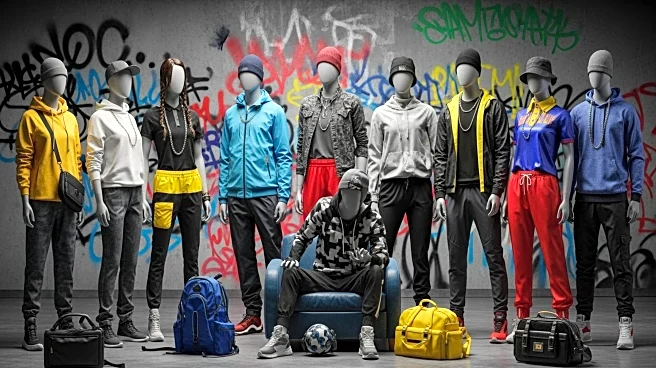What's Happening?
Alex Ovechkin is set to play his milestone 1,500th career NHL game against the Ottawa Senators. In celebration of this achievement, his teammates arrived at Capital One Arena wearing outfits inspired by Ovechkin's appearance in a 2012 Russian rap video.
The outfits included a plain white T-shirt with a screenshot of Ovechkin from the video, a gold chain with a number 8 pendant, and a white baseball cap turned sideways. The NHL's newly relaxed dress code allowed players to pay tribute in this unique fashion. Clips from the video were displayed on the arena's video board, and players mimicked Ovechkin's poses from the video. The rap track, titled 'Champion,' features Ovechkin rapping a verse and dancing, which gained significant attention in Russia upon its release.
Why It's Important?
This event highlights the cultural impact of Alex Ovechkin, not only as a hockey player but as a public figure with influence beyond sports. By celebrating his 1,500th game in such a personalized manner, the Capitals players demonstrate the camaraderie and respect within the team. Ovechkin's milestone is significant as he becomes the 24th player in NHL history to reach this number of games, underscoring his durability and skill in the league. Additionally, he is on the verge of becoming the first player to score 900 career goals, further cementing his legacy in hockey history.
What's Next?
As Ovechkin approaches the 900-goal mark, the anticipation builds for his next historic achievement. The Capitals' celebration of his 1,500th game may set a precedent for future milestones, encouraging teams to honor their players' achievements in creative ways. If the Capitals win against the Senators, they plan to celebrate by playing 'Champion' in the locker room, further integrating Ovechkin's cultural contributions into their team spirit.
Beyond the Headlines
The relaxed dress code in the NHL allows players to express individuality and creativity, potentially leading to more personalized tributes and celebrations in the future. This shift in policy reflects broader changes in professional sports, where athletes are increasingly seen as cultural icons with influence extending beyond their athletic performance.















